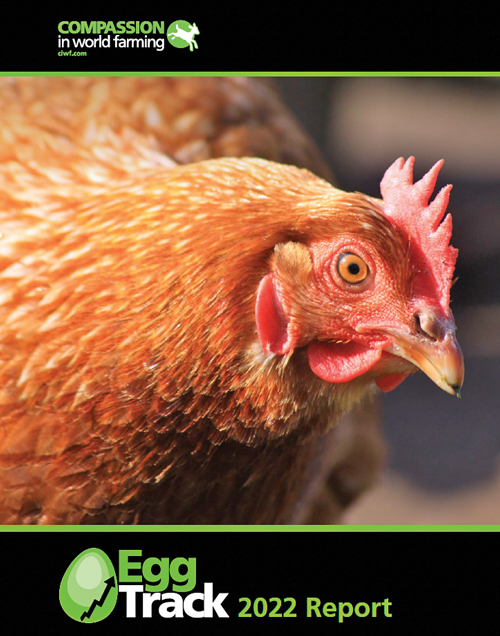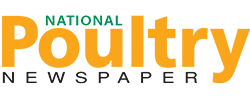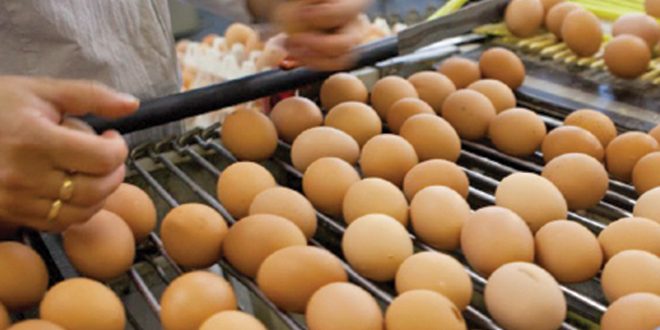ABOVE: Danone successfully achieved 100 percent cage-free production throughout its global business and provides the foreword for the EggTrack report.
More companies are making global cage-free egg commitments, according to the sixth annual EggTrack report by Compassion in World Farming released recently.
Compassion in World Farming is the leading international farm animal welfare charity, campaigning to improve the lives of millions of farm animals through advocacy, lobbying for legislative change, and positive engagement with the global food industry.
Our established international food business program aims to achieve a holistic approach to sustainable food production by driving transformational change for farm animals, reducing our reliance on animal sourced foods, and moving the food industry towards more regenerative, nature friendly farming.
The expansion of commitments beyond only regional policies to enable progress at a global scale is strongly encouraged by the charity, and in the past 12 months alone more companies – including Pizza Express, Yum Brands and Bloomin’ Brands have made new global cage-free commitments.
EggTrack continues to measure and encourage the transition to cage-free eggs by capturing and reporting progress against the cage-free commitments of major food businesses.
The report encourages transparency and drives business-to-business conversations that help deliver a stable and successful transition to the common goal of a 100 percent cage-free future.
There are 232 companies monitored in EggTrack and, for the first time, the 2022 report had a dedicated section for Asia-Pacific to encourage companies in that region to publicly report on their transition to cage-free systems.
Companies such as Coles, Woolworths and Allied Pinnacle are communicating clearly on the progress of their cage-free commitments, and we encourage others in the country such as Aldi, IGA and George Weston Foods to follow their lead by publicly reporting their progress annually.
For those companies that are yet to make a public commitment to phase out cages in their egg supply chain, we urge them to get behind the growing move towards cage-free production.
Of the 232 companies in this year’s EggTrack, 175 (75 percent) report progress against their cage-free commitments – an increase from 71 percent in 2021 – with an average 79.1 percent transition to cage-free.
Of the companies that reported global progress, their cage-free sourcing increased from 55.2 percent in 2021 to 63.1 percent in 2022.
In 2022, of the 58 companies with global commitments, 34 (58.6 percent) reported progress against these commitments, and we saw new global cage-free pledges from Bloomin’ Brands, Darden Restaurants, Focus Brands, Pizza Express, Royal Caribbean International, The Cheesecake Factory, Wyndham Hotels and Resorts, and Yum Brands.

The recently released annual EggTrack report.
All this progress should be applauded against the backdrop of the ongoing effects of COVID-19, the war in Ukraine, the impacts of inflation and recent increases in cases of the highly pathogenic avian influenza.
One company that has successfully achieved 100 percent cage-free production throughout its global business, and which provides the foreword for the EggTrack report, is Danone.
Danone global farming expertise manager Cees Jan Hollander said, “Danone has been working on animal welfare for many years, embedding it as a key pilar of its regenerative agriculture strategy.”
“When we took our commitment to cage-free eggs and egg ingredients in 2018, we knew it wouldn’t happen overnight and that we would need to work closely with our suppliers.
“But we persisted and reached our target of 100 percent cage-free eggs and egg ingredients in 2020.
“Tracking and reporting our progress are important ways to hold ourselves accountable inside and outside our company, answering consumers and investors’ growing demand for transparency and improvement via benchmarks such as the Business Benchmark on Farm Animal Welfare.
“What’s exciting is that, thanks to tracking from Compassion in World Farming, we can see that cage-free eggs are swiftly becoming the industry standard.”
The Asia-Pacific market is the fastest-growing cage-free market due to increased demand, product innovation and increased disposable income.
In Australia, 70 percent of the population was concerned about the welfare of hens kept in battery cages, yet cage eggs still make up about 40 percent of supermarket egg purchases, according to Australian Eggs.
The catering sector uses a higher proportion of eggs from caged hens and caged layer hen farming still makes up more than 60 percent of total egg production.
The country plans to outlaw battery cages by 2036 and, though many argue that this could be achieved in a much shorter timeframe, it is still unclear if this target will be reached.
In Europe, legislation is catching up with the industry move to cage-free eggs.
Following a successful European citizens’ initiative led by Compassion in World Farming, which gained over 1.4 million signatures, the European Commission made a landmark decision in June 2021 to introduce legislation to phase out cages for all farm animals across the continent by 2027.
We are witnessing a market shift towards cage-free production across the globe and producers need to act now to meet the growing demand for cage-free eggs by investing in systems that are fit for purpose and fit for future – such as good barn, free range or organic systems.
Compassion remains positive that the increase in commitments across Asia-Pacific and the implementation of global pledges towards 100 percent cage-free supply chains will help the region to progress.
With the consistent upward demand for cage-free eggs, however, companies should be careful not to opt for systems such as ‘combination’ or ‘limited access’, as they limit hen movement and are not considered to be a suitable alternative to caged housing.
As such, Compassion is asking companies to publish updated language in their cage-free commitments, specifying that they will not allow combination or limited access systems in their supply chain.
In the report, for example, 24 companies have clear statements against the use of combination systems within their supply chain.
These include Aldi Nord, Barilla, Bennet, Carrefour Spain, Chef Express, Coles Group, Coop Italy, Domino’s Pizza – United Kingdom and Ireland, E Leclerc France, Eroski, Eurovo, Fattoria Roberti, GB Foods, Grupo Avícola Rujamar, Gruppo Sabbatani, Gruppo Selex, Huevos Guillén, Kroger, Marr, Meijer, Metro Group, Sammontana, Tesco and Unilever.
The charity also advises that to achieve 100 percent cage-free production, companies must ensure that their cage-free policies include all egg – shell, product and ingredient eggs.
This will be a focus in the 2023 EggTrack report, where the egg categories captured will include egg ingredients for the first time, recognising the huge volume of eggs used in processed foods and which impact a high number of hens.
As the global egg industry is shifting to cage-free production and implementation deadlines are quickly approaching, it is essential that companies effectively collaborate with their suppliers to ensure their value chain is on track for fully implementing cage-free commitments, exclusive of combination and limited access systems, by the expected timelines.
Compassion in Food Business global director Dr Tracey Jones said, “Despite difficult economic times, companies are still forging ahead with their cage-free commitments, which should be applauded.”
“It’s fantastic to see an increase in global commitments from leading companies that are showing a reasonable transition to cage free.
“EggTrack is an important tool in ensuring this progress continues, helping to drive transition and compliance.
“But going forward, companies must address all egg categories in their commitments and ensure the cage-free systems they transition into are fit for purpose.
“Cage-free production is a smart investment, as increasing consumer and corporate demand will only accelerate this global trend,” Dr Jones said.
The Asia Food Business team at Compassion can support any food businesses on their commitments and transition to cage-free systems.
There is also an opportunity for companies that make cage-free commitments to apply for a Good Egg Award.
Since 2010, we have recognised companies in Australia and New Zealand that have made welfare commitments for laying hens.
Companies awarded include Coles, Woolworths, Ikea and McDonalds.
To learn more, visit eggtrack.com or compassioninfoodbusiness.com

